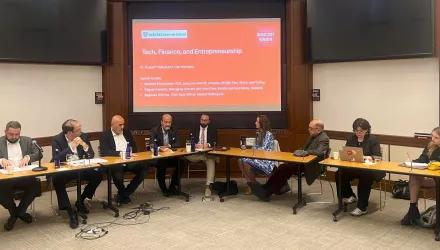
The European Union unveiled the Instrument in Support of Trade Exchanges (INSTEX) as a special purpose vehicle (SPV) in February 2019 to facilitate trade in humanitarian goods between the EU and Iran. Presently, these goods do not fall under the purview of American sanctions, but private sector participants ranging from banks to pharmaceutical companies remain reluctant to conduct business in the country.
These concerns stem from a business environment that lacks the rule of law, concealing the involvement of Specially Designated Nationals (SDNs), terrorist groups like the IRGC, and other government entities within legitimate commercial channels. One such example is Parsian Bank, a private Iranian bank responsible for handling a significant portion of humanitarian transactions, which was designated by the U.S. Treasury in October 2018 for links to the Basij.
Should it stick to the transfer of humanitarian goods, INSTEX will remain outside the lens of Washington’s sanctions apparatus; however, Tehran seems unwilling to stay in the JCPOA with just the promise of food and medicine. It is likely that the Iranian government will pressure the EU to expand INSTEX to include transactions in sanctioned goods, especially oil, likely to be denominated in euros to avoid touching the dollar.
In spite of initial hopefulness, the Europeans will eventually face a reckoning with the facts: Washington’s financial leverage over Brussels has, arguably, never been greater since the establishment of the euro in 1999. The power of the U.S. Dollar and weaponization of the U.S. financial system cannot be challenged successfully by Europe at this moment.
Not All Bulge Brackets Are Created Equal
Prior to the 2008 financial crisis, there were no illusions about the size and scope of US banks, with Goldman Sachs, Morgan Stanley, JPMorgan, and others, among others, all boasting global reputations. Yet alongside them were well-developed, international European investment banks that maintained global reputations, in some cases, outpacing those of their American rivals.
2006 was the last year before the 2008 financial crisis. RBS, Deutsche Bank, BNP Paribas, and Barclays dwarfed Goldman Sachs or Morgan Stanley in global lending. Even the undisputedly American equities market saw European banks like Dresdner Kleinwort, ABN Amro, and BNP Paribas, carve out territory in the Top 20 names. One would be hard pressed to replicate those results today.
The continent-wide metrics in Figure I (left, top) and II (left, below) show this damning trend: the shrinking of European banks’ market share and the rise of their American counterparts. No individual case is arguably more indicative of this than that of Deutsche Bank.
In 2018, Deutsche dropped out of its Top 10 spot in M&A Advisory for the first time since 2000, seeing its market share more than halve from 10.81% to 4.65%. Even Barclays, arguably the poster-child for a revival of European investment banking, is mired in a dispute with activist shareholder Edward Bramson. Regardless of the outcome of this battle, the firm’s retail banking and credit card segments remain significantly more profitable than its investment banking division, earning the ire of shareholders.
At the same time, American banks have dominated the Western European market (Figure III, bottom left). Deutsche Bank has not made the top three investment banks for Western European equity offerings since 2014, with US banks and UBS dominating the top three spots ever since then. Unlike Barclays’ high margin retail banking division, Deutsche faces a unique German banking landscape dominated by publicly-owned institutions that have little profit incentive. Against this backdrop, there is no saving grace for the bank, which has seen its effective cost-cutting techniques met with little success in the opposite end of revenue growth. The company posted a net profit in 2018, but remains a shadow of its pre-crisis self.
For the financial warriors at the U.S. Treasury, the prospect of an expanded INSTEX has been concerning to some. Prior to the announcement that it would focus on humanitarian goods, there was widespread belief that Brussels would try to house the clearing system in a sovereign institution, like the European Central Bank or a national central bank like the German Bundesbank. In doing so, Brussels would force the Treasury to make a “tails I win, heads you lose” bet: either Washington backs down from sanctioning a sovereign and, in doing so, is humiliated, or Washington sanctions a central bank and opens the floodgates of financial markets to unprecedented instability. The latter could easily spark another Eurozone crisis and trigger serious discussions about the prudential implications of sanctions policy.
But the size and stature of its banks confers a powerful tool onto Washington: the weaponization of reputation. When smart sanctions were first put into development, Senior U.S. Treasury officials met personally with compliance officers and CEOs to convince them that the costs of doing business with rogue states, like Iran or North Korea, were too big to justify commercial investment. More recently, as Huawei found itself in Washington’s sights, the first to flee the scene were its Wall Street lenders, with Standard Chartered and HSBC both jumping ship.
Were INSTEX to be housed within a sovereign institution, its European multinational customers would face the prospect of a hostile US banking sector. For these New York-based Titans, the prospects of both reputational costs and hard-hitting penalties for violations of US sanctions would be enormous, even when weighed against institutional clients. Lost business is a cost for shareholders, but a billion-dollar fine, like those faced by SocGen ($1.4B), Standard Chartered ($1.5B), or the mother of all violators, BNP Paribas ($8.9B) outweighs any minute concerns in this field.
If the Big Five banks—Citi, Goldman Sachs, Morgan Stanley, JP Morgan, and Bank of America-Merrill Lynch—were to isolate or restrict services to a multinational client, the pressure would then be shifted from Washington to Brussels to organize a response. Brussels has already tried to mitigate the effect of Washington’s financial warfare with a blocking statute, but this has failed to counter the power of the weaponized dollar ecosystem.
One potential response could come in the form of a restriction of access to SWIFT, the financial messaging service based in Belgium previously used against Iran. In this case, the Europeans themselves would face a “heads I win, tails you lose” situation: either they would back down from a SWIFT restriction, reducing INSTEX to a channel for SMEs, or they would restrict systemically important banks’ access to the global financial system. The collapse of Lehman Brothers offers powerful lessons on the weight of one bank’s stability on that of the globe, with SWIFT’s tenure as a global messaging service likely ended by such a move to boot.
The Long Run
In short order, Washington would force the pressure back onto Brussels with such a move. In its post-Brexit negotiations, Brussels has developed a new aggressive financial statecraft, but it is still too early to tell whether this approach will be successful. The European Commission’s hardball on euro derivatives clearing in London culminated in an extension of access for one year after a hard Brexit for financial stability, while its usage of MiFiD II equivalence against Switzerland has only caused Bern to escalate the debate.
For all the white papers and policy proposals that Brussels publishes on expanding the role of the euro internationally, its financial statecraft will be limited to a regional role until it can become a true monetary and banking union. The ambitious Meseberg Declaration in mid last year proclaimed Franco-German cooperation and crossed several previously considered red lines for Berlin, such as the endorsement of a common eurozone budget. But digging deeper into the statements made, there was little promised other than an expansion of Brussel’s existing authority through Cohesion Funding and the European Stability Mechanism.
Worse, Berlin’s decision to make stability financing dependent on the choices of national parliaments threatens to further complicate future financial crises: Lehman Brothers collapsed over the course of a weekend, but the debate over Eurozone banking reforms has dragged on for soon to be a decade.
The two most important reforms to internationalizing the euro—the creation of a common deposit insurance scheme and the creation of a pan-Eurozone safe asset—were barely, if at all, addressed in the piece. With the political winds in Berlin shifting against deeper Eurozone integration even more so than before, Brussels appears no more prepared to handle a serious crisis, whether caused by Iran or Italy, than it was before 2008.
Michael B. Greenwald is a fellow at Harvard Kennedy School's Belfer Center for Science and International Affairs. He is deputy executive director of the Trilateral Commission, senior adviser to Atlantic Council President and CEO Frederick Kempe, and adjunct professor at Boston University. From 2015-2017, Greenwald served as the US Treasury attaché to Qatar and Kuwait. He previously held counterterrorism and intelligence roles in the US government.
Greenwald, Michael. “Too Big to Evade: The Costs of Europe Sticking with Iran.” Belfer Center for Science and International Affairs, Harvard Kennedy School, February 20, 2019




